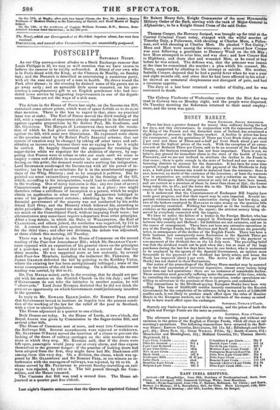The debate in the House of Peers last night, on
the Income-tax Bill, contained some minor points, which want of space forbids us to do more than mention. There is the less to regret in that, since no practical issue was at stake. The Earl of RIPON moved the third reading of the bill, with a repetition of arguments already employed in its defence and against opposite propositions by Sir Robert Peel, Mr. Goulburn, and Mr. Gladstone. The Marquis of LANSDOWNE then moved the resolu- tion of which he had given notice ; also repeating other arguments against the bill, with some new illustrations. He expressed some alarm at the question raised by Sir Robert Peel's financial scheme, that our system of taxation may be changed by taking off other taxes and sub- stituting an income-tax, because there was no saying how far it might be carried. He happily illustrated the argument for retaining the sugar-duties while we negotiate for the abolition of slavery, by sup- posing that France were to refuse to take our coals until we cease to employ women and children in manacles in our mines : whatever our feeling on this point, the demand would excite nothing but indignation. Lord Bnonostam condenwed the Income-tax with all his power of in- vective ; but he found no substitute for it in the unsubstantial sugges- tions of the Whig Ministry ; and so he accepted it perforce. But he pointed out some extraordinary oversights in the framing of the bill, which, according to his interpretation, would lead to endless confusion in the working. One of many instances is this : any two (out of seven) Commissioners for general purposes may act in a place : two might therefore refuse a certificate of exemption to a person, which he might obtain on application to other two ! Lord MELBOURNE indulged in some of his goodhumoured sarcasm ; admitting by the way, that the financial government of the country was not conducted by his noble friend Earl Grey, and the Ministry which followed his, according to strict principles—they trusted too much to the surplus, laying the burden too much on the Consolidated Fund, without imposing fresh taxes : but circumstances may sometimes require a departure from strict principles. After a long debate, in which the Duke of WELLINGTON, the Earl of CLARENDON, and others joined, the resolution was negatived, by 112 to 52. A contest then took place against the immediate reading of the bill for the third time; and after two divisions, the debate was adjourned, at three o'clock this morning, till Tuesday.
There was a long debate in the House of Commons on the second reading of the Poor-law Amendment Bill ; which Mr. SHARMAN CRAW- FORD opposed with an exposition of his general views on the principles of a poor-law ; and he moved that it be read a second time that day three months. He was supported more or less zealously, by several Anti-Poor-law Members, including the indiscreet Mr. FERRAND. Sir JAMES GRAHAM defended the bill by pointing to the Keithley Union, where the existing law has been surreptitiously infringed ; some of the worst consequences of the old law resulting. On a division, the second reading was carried, by 260 to 61.
Mr. Fox Matrix stated, early in the evening, that he should not per- sist with his motion on the Scottish Church on the 5th July ; and that if Government do not take the initiative in another session, he will " afterwards." Lord JOHN RUSSELL declared that he did not think the present an opportunity on which Government could judiciously interfere in the question.
In reply to Mr. EDWARD ELLICE junior, Sir ROBERT PEEL stated that Government intend to institute an inquiry into the present condi- tion of the working of the law for the relief of the poor in Scotland, with a view to ulterior legislation.
The House adjourned at a quarter to one o'clock.
Both Houses sat today. In the House of Lords, at two o'clock, the Royal Assent was given by Commission to the Sugar-duties Bill, and several other bills.
'The House of Commons met at noon, and went into Committee on the Railways Bill. Several amendments were rejected or withdrawn. Mr. STAFFORD O'BRIEN moved the insertion of a clause to prevent the locking of the doors of railway. carriages on the side nearest the sta- tions at which they stop. Mr. RUSSELL said, that if the doors were left open, passengers would jump out at every alarm, and thus expose themselves to the greatest danger : if the practice of locking doors had been adopted from the first, they might have had Mr. Huskisson still among them this very day. On a division, the clause, which was op- posed by Mr. GLADSTONE and Sir ROBERT PEEL, as too minute an in- terference with the managers of railways, was rejected, by 92 to 69. A clause moved by Mr. PLUMPTRE to prevent Sunday-travelling on rail- ways was rejected, by 105 to 8. The bill passed through the Com- mittee, and the House resumed.
The Customs Act Bill was read a second time. The House ad- journed at a quarter past five o'clock.


























 Previous page
Previous page